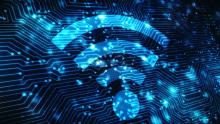
For many people in Washington state, and across the country, public Wi-Fi has become a digital lifeline during the COVID-19 pandemic.
According to Pew Research, more than one-in-four adults do not have broadband internet access and - with the closure of public gathering spaces including libraries and cafes - are increasingly going to areas where public signals are still available to stay connected.
Washington state is in the process of building out approximately 600 public hotspots to keep Washington communities connected, most of which are now available.
With the increase in public Wi-Fi use, the state Privacy Office and state Office of Cybersecurity wanted to share some tips for safely connecting online.
- Confirm you have the correct network: Make sure you are connecting to the right network. Bad actors may create networks that look harmless based on their name, but they are in fact directing you to connect to a network set-up to see your internet surfing. This means if you enter login credentials or passwords into websites, the hacker will be able to steal your information. To protect against this, read the network name very carefully and if possible, ask an employee or check signage of the business to make sure the network is legitimate.
- Turn off auto-connect: Many devices (smartphones, laptops, and tablets) have automatic connectivity settings. This setting allows your devices to conveniently connect to nearby networks. This is okay with trusted networks, but it can also connect your devices to networks that may be unsafe. You can disable this feature through the settings feature on your device. Keep these settings turned off, especially when you're traveling to unfamiliar places.
- Turn off file sharing: Make sure to turn off the file sharing option while on public Wi-Fi. You can turn off file sharing from the system preferences or control panel, depending on your operating system.
- Use a VPN: Consider installing a VPN (Virtual Private Network) on your device. A VPN is the most secure option for digital privacy on public Wi-Fi. It encrypts your data as it passes to and from your device and acts as a protective "tunnel" so that your data is not visible as it passes through a network.
- Do not access sensitive information, if possible: Even if you have a VPN, it is still not recommended to access personal bank accounts, or similar sensitive personal data like social security numbers, on unsecured public networks. For financial transactions it may be better to use your smartphone's hotspot function instead, if that is an option.
- Use antivirus: Install the latest version of an antivirus program on your laptop. Antivirus can help protect you while using public Wi-Fi by detecting malware that might get into your system while using the shared network. An alert will warn you if known viruses are loaded onto your device or if there's any suspicious activity.
- Use two-factor or multifactor authentication (MFA): Using MFA when logging into websites means you need a second verification code (texted to your phone or provided by an app or physical key) which further protects you. So even if a hacker gets your username and password, without the other authentication code they can't access your accounts.
For more information, please see the state Chief Privacy Officer's complete guide for safely using public Wi-Fi.
